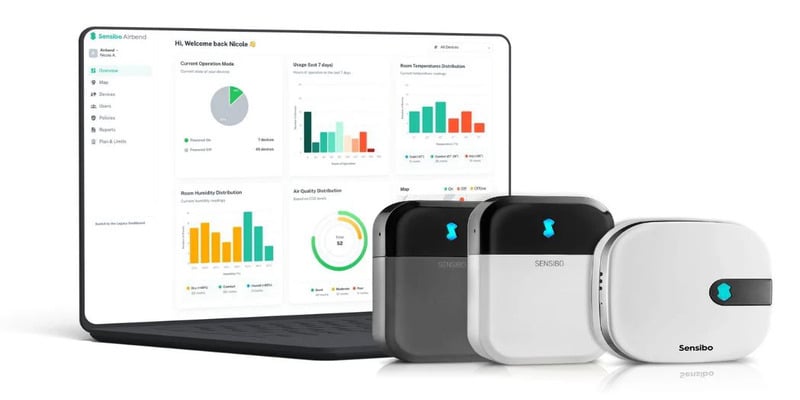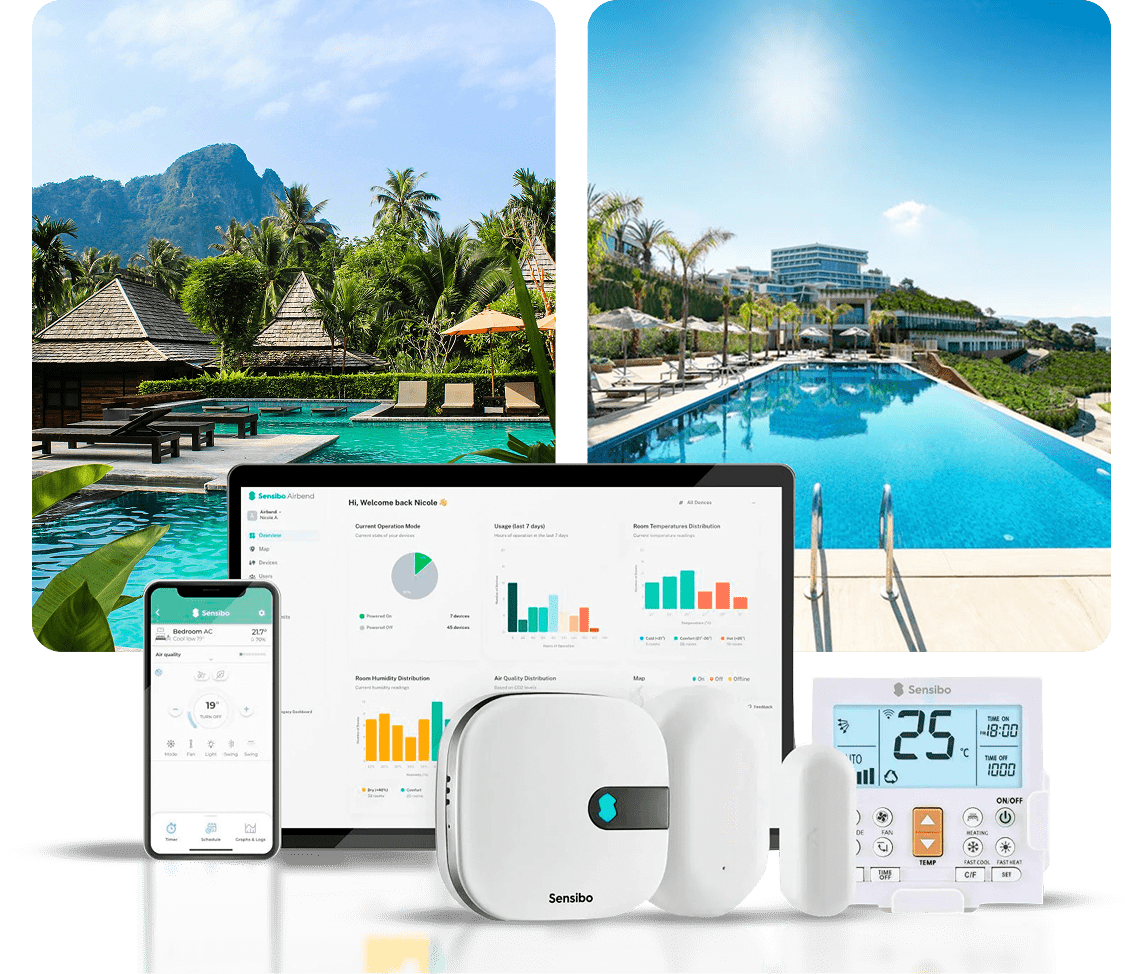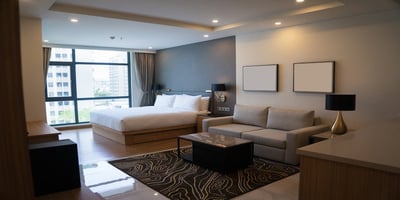The Future of Sustainable Hospitality: AI, Energy Efficiency, and Intelligent Climate Management
Key Takeaways
- HVAC systems account for 40-60% of hotel energy consumption, making smart climate control the most effective lever for reducing both operational costs and carbon emissions in hospitality operations.
- Guest expectations have shifted: travelers now demand both comfort and environmental responsibility, with sustainable hotels achieving 12% higher revenue than conventional properties while consuming 25% less energy.
- Smart HVAC platforms deliver measurable results: proven reductions of 40%+ in energy bills through automated controls, sensor networks, and AI-driven optimization that maintain comfort while eliminating waste.
- Implementation barriers have disappeared: modern systems install in minutes without infrastructure changes, integrate with existing AC units and property management software, and provide centralized control across multiple locations.
- Sustainability is strategic positioning: hotels that invest in intelligent climate management today meet regulatory requirements, attract eco-conscious travelers, reduce grid strain, and future-proof operations as renewable energy adoption accelerates.
In the hospitality industry, the drive toward sustainability is no longer optional. Guests expect high comfort, but they also increasingly demand environmental responsibility. Meanwhile, energy costs continue to rise and climate mandates push hotels to reduce greenhouse gas emissions. For hotels and resorts, the way forward lies in intelligent air conditioning and climate control systems that combine efficiency, sensing, and data.
Energy Use, Emissions, and Why HVAC Matters
Hotels are energy-intensive operations. In many properties, heating, ventilation, and air conditioning systems account for 40 to 60 percent of total energy consumption. Retrofits and smarter control of HVAC systems, therefore, offer one of the most effective ways to reduce costs and carbon footprint.
Energy-efficient measures in hotels can yield strong financial returns. Studies show that standard efficiency upgrades can cut energy expenses by around 20 percent, while smart thermostats typically lower energy bills by up to 30 percent.
Buildings in the tourism sector contribute a measurable share of global greenhouse gas emissions, and the hospitality segment alone accounts for roughly one percent of total global CO₂ output. Without change, emissions from tourism could rise by over 130 percent by 2035. Hotels that take control of energy use today are positioning themselves as future-ready, resilient, and responsible operators.
Guest Comfort and Indoor Air Quality
Guest satisfaction remains at the heart of hospitality. Smart climate systems use real time sensing to monitor temperature, humidity, and air quality, automatically adjusting to maintain comfort. These systems optimize not just occupied rooms but shared areas as well, ensuring that the atmosphere feels consistently fresh and comfortable.
Air quality has become a defining factor in guest experience. With heightened awareness around wellness and health, guests are noticing the freshness and cleanliness of indoor air more than ever before. Hotels that maintain optimal humidity and ventilation also protect their assets by preventing mold and extending the lifespan of interiors and equipment.
Why Eco Branding Is Key
Today’s travelers are increasingly eco-conscious. Most global travelers say they want to make more sustainable choices, and more than half plan to actively reduce energy use during their trips. For hotels, visible sustainability actions that lower emissions are powerful differentiators.
Research shows that sustainable hotels often outperform their competitors. Properties that integrate green measures see an average revenue increase of about 12 percent compared to non-sustainable peers. Green buildings also consume roughly a quarter less energy and emit about a third less CO₂ than standard ones. The data is clear: environmental responsibility now drives both profitability and brand loyalty.
AI and Unified Control
Artificial intelligence is reshaping hotel operations. AI models can learn patterns from occupancy, weather, and guest behavior to predict demand and make proactive adjustments. These systems help maintain comfort while minimizing energy use and maintenance costs.
Unified dashboards bring all these insights together. Facility managers can monitor and control temperature, air quality, and system performance across multiple locations in real time. This level of visibility simplifies management and allows operators to make decisions based on data, not guesswork.
Smart HVAC Control: From Challenge to Solution
Hotel HVAC systems present distinct operational challenges. Properties manage dozens to hundreds of independent AC units with limited visibility once guests occupy rooms. Energy waste accumulates from units left running in vacant spaces, open windows defeating cooling systems, and inconsistent temperature management across floors and properties.
Smart controllers address these issues through sensor integration and centralized management. Motion detection automatically powers down units in unoccupied rooms. Door and window sensors shut off air conditioning when openings are detected, resuming operation when closed. Facility managers gain remote control over individual units or entire properties from unified dashboards, enabling real-time adjustments and usage monitoring by room, zone, or property.
Installation requires no tools or infrastructure changes. Controllers integrate with existing split AC systems in minutes, compatible with thousands of models across major manufacturers. Open APIs allow connection with property management systems and building automation platforms. Temperature limits, automated scheduling, and conditional rules can be applied across hundreds of units simultaneously, maintaining guest comfort while enforcing efficiency standards.
 Sensibo Airbend in Context
Sensibo Airbend in Context
Among the leaders in intelligent climate control, Sensibo Airbend stands out for its application in hospitality. Designed for hotels, resorts, and serviced apartments, it uses AI and smart sensing to automate and optimize every air conditioning unit on the property. The system works with existing split ACs, so installation is quick and non-disruptive.
Book a meeting with the Sensibo team at IHTF 2025 Singapore
In a recent case study, Prestige Bookings, a luxury resort operator in Cyprus, implemented Sensibo Airbend to manage dozens of AC units remotely. The results were significant: more than 40 percent reduction in energy bills, improved operational efficiency, and increased guest satisfaction. The property also reported a stronger appeal among eco-conscious travelers thanks to measurable sustainability progress.
Sensibo’s innovation has been recognized internationally with inclusion in TIME’s Best Inventions list, reflecting the company’s role in shaping the next generation of climate technology for hospitality.
Learn more about Sensibo Airbend for the Hospitality business
Greenhouse Gas Mitigation and Long-Term Strategy
By cutting energy waste and optimizing usage, smart HVAC platforms directly reduce emissions associated with electricity consumption. They also help hotels better manage peak demand, lowering strain on local power grids and aligning with broader decarbonization goals.
As renewable energy adoption grows, efficient management becomes even more critical. The combination of clean energy and intelligent climate control creates a virtuous cycle of lower costs, fewer emissions, and higher guest satisfaction.
For hoteliers, the path forward is clear. Start with a property energy audit, introduce occupancy-based control, integrate air quality monitoring, and adopt a unified AI-driven platform to oversee it all. Smart climate management is not simply a technology upgrade; it is a strategic investment in the future of sustainable hospitality.
Book a meeting with the Sensibo team at IHTF 2025 Singapore
Footnotes
- HVAC Energy Use in Hotels: A Review, PMC, 2024. https://pmc.ncbi.nlm.nih.gov/articles/PMC11500959
- “Smart Comfort and Energy Efficiency Strategies for Hotels,” NZero, 2024. https://nzero.com/blog/smart-comfort-energy-efficiency-strategies-for-hotels-and-lodging-facilities
- “Energy Management and Savings Tips for Hotels,” Shipley Energy, 2024. https://www.shipleyenergy.com/resources/commercial/energy-management-savings-tips-for-hotels
- “Smart Thermostats in Hospitality,” Verdant by Copeland, 2023. https://verdant.copeland.com/hospitality
- “Market Potential for Energy Efficiency in the Hospitality Sector,” Minnesota Department of Commerce, 2023.
https://mn.gov/commerce-stat/pdfs/card-report-market-potential-hospitality.pdf - “Hotel and Hospitality Industry Sustainability Statistics,” Oysterlink, 2024. https://oysterlink.com/spotlight/hotel-hospitality-industry-sustainability-statistics
- “The Rise of Sustainability in Hospitality,” Spacewell, 2024. https://spacewell.com/resources/blog/the-rise-of-sustainability-in-hospitality-the-pivotal-role-of-energy-efficiency
- Booking.com Sustainable Travel Report, Global Sustainable Tourism Council, 2024. https://www.gstc.org/booking-sustainable-travel-report-2024
- “Cost Reduction Using AI in HVAC,” Analytika, 2023.
https://analytika.com/cost-reduction-using-ai-in-hvac - “Renewable Energy Use in Green Hotels for Sustainability,” ResearchGate, 2023. https://www.researchgate.net/publication/375566371_Renewable_Energy_Use_in_Green_Hotels_for_Sustainability_A_Systematic_Review



































.jpg?height=200&name=photo_2025-01-03_19-12-43%20(1).jpg)


.jpg?height=200&name=photo_2024-07-05_21-25-23%20(1).jpg)


